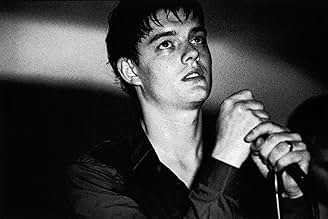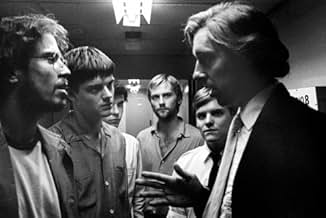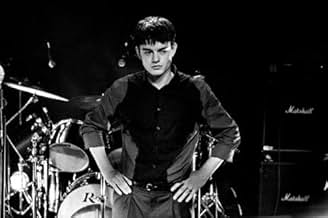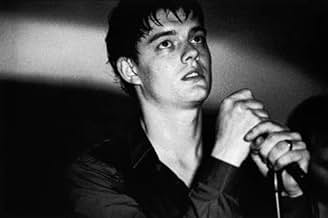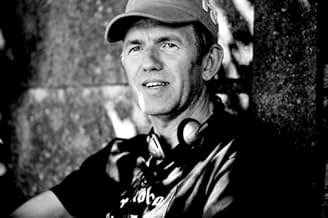ÉVALUATION IMDb
7,6/10
70 k
MA NOTE
Un profil de Ian Curtis, l'énigmatique chanteur de Joy Division dont les ennuis personnels, professionnels et romantiques l'ont conduit à se suicider à l'âge de 23 ans.Un profil de Ian Curtis, l'énigmatique chanteur de Joy Division dont les ennuis personnels, professionnels et romantiques l'ont conduit à se suicider à l'âge de 23 ans.Un profil de Ian Curtis, l'énigmatique chanteur de Joy Division dont les ennuis personnels, professionnels et romantiques l'ont conduit à se suicider à l'âge de 23 ans.
- Director
- Writers
- Stars
- A remporté le prix 1 BAFTA Award
- 31 victoires et 36 nominations au total
Martha Myers Lowe
- Ian's Sister
- (as Martha Myers-Lowe)
Mary Jo Randle
- Debbie's Mother
- (as Mary-Jo Randle)
Avis en vedette
For every icon, there is an unknown predecessor who paves the way. Before there was Kurt Cobain, there was Ian Curtis, lead singer of the post-punk band, Joy Division. 27 years after his tragic death, Curtis' incredible contribution to music is finally being recognized in Anton Corbijn's film, "Control." It's only fitting that Corbijn serve as director since it was his early photographs of Joy Division that reflected the band's dark, introspective songs. Corbijn went on to photograph and direct videos for such musical greats as U2, David Bowie, Depeche Mode, R.E.M. and Metallica.
With his first feature film, Corbijn avoids the pitfalls of many music video directors who inundate us with flashy and unnecessary edits and camera angles. Instead, he lets the stark black and white of the film tell the story of a lead singer tortured by epilepsy, guilt, depression and suicidal thoughts. The use of black and white also captures the factory town of Manchester, England in the late 1970s, a city crumbling under industrial and economic stress. Manchester has since rebounded and is once again thriving.
Curtis is played by relative newcomer, Sam Riley, who's quiet and unassuming approach portrays an artist inspired by his heroes, David Bowie and Iggy Pop. At a chance meeting following a Sex Pistols concert, Curtis bonds with three fellow musicians to form the band.
As Joy Division begins to flourish, Ian's relationship with his young wife, Deborah, continues to distance itself. Academy Award nominee, Samantha Morton plays the confused wife trying to understand her husband's depressed soul. The film is based on Deborah Curtis' autobiography, "Touching From A Distance", so it comes as a surprise that Morton's character does not have more scenes in the movie.
The key to Control is understanding Curtis' depression, which the film accomplishes to near perfection. As he battles epilepsy, the young singer lives in constant fear that his next seizure will be his last. His only option is to swallow a daily cocktail of prescription drugs with side effects so terrible, that most of us would rather tempt fate than endure the aftermath of the pills.
Ian's spirit is also tortured by overwhelming guilt brought on by an extra-marital affair with a part-time journalist, played by Romanian-born Alexandra Maria Lara.
The most telling scene comes when Ian records an in-studio track for the song "Isolation." While Curtis stoically sings into the microphone, his band mates are distracted with the normal banter that typically occurs in a studio.
"Mother, I tried, please believe me. I'm doing the best that I can. I'm ashamed of the things I've been put through. I'm ashamed of the person I am." The lyrics seem to fall on deaf ears except for those of the sound engineer who refers to it as "genius." But Ian's brilliance is also a desperate cry for help ignored by everyone in the studio.
The 27-year-old Riley does an excellent job of capturing Curtis' aloofness on stage. Singers such as Jim Morrison, Kurt Cobain and even the early years of Michael Stipe would often drift into the moment of the song. But when Curtis performed, he immersed himself into his own world where the music simply served as the soundtrack. Riley skillfully draws us into Ian's dark world with a range of subtle head movements and facial expressions to a whirling explosion of arm gyrations that came to personify the singer's stage performances.
Overwhelmed with grief, shame and depression, Ian finally succumbs to his demons at the young age of 23. He left behind a wife, a child and a musical legacy that is finally receiving its just rewards nearly three decades later.
For those looking for a story solely about Joy Division, Control may not be for you. But for those seeking an intuitive perspective into the anguished spirit of one of the most influential alternative bands in history, you will certainly find it in this depressing but incredibly beautiful film.
With his first feature film, Corbijn avoids the pitfalls of many music video directors who inundate us with flashy and unnecessary edits and camera angles. Instead, he lets the stark black and white of the film tell the story of a lead singer tortured by epilepsy, guilt, depression and suicidal thoughts. The use of black and white also captures the factory town of Manchester, England in the late 1970s, a city crumbling under industrial and economic stress. Manchester has since rebounded and is once again thriving.
Curtis is played by relative newcomer, Sam Riley, who's quiet and unassuming approach portrays an artist inspired by his heroes, David Bowie and Iggy Pop. At a chance meeting following a Sex Pistols concert, Curtis bonds with three fellow musicians to form the band.
As Joy Division begins to flourish, Ian's relationship with his young wife, Deborah, continues to distance itself. Academy Award nominee, Samantha Morton plays the confused wife trying to understand her husband's depressed soul. The film is based on Deborah Curtis' autobiography, "Touching From A Distance", so it comes as a surprise that Morton's character does not have more scenes in the movie.
The key to Control is understanding Curtis' depression, which the film accomplishes to near perfection. As he battles epilepsy, the young singer lives in constant fear that his next seizure will be his last. His only option is to swallow a daily cocktail of prescription drugs with side effects so terrible, that most of us would rather tempt fate than endure the aftermath of the pills.
Ian's spirit is also tortured by overwhelming guilt brought on by an extra-marital affair with a part-time journalist, played by Romanian-born Alexandra Maria Lara.
The most telling scene comes when Ian records an in-studio track for the song "Isolation." While Curtis stoically sings into the microphone, his band mates are distracted with the normal banter that typically occurs in a studio.
"Mother, I tried, please believe me. I'm doing the best that I can. I'm ashamed of the things I've been put through. I'm ashamed of the person I am." The lyrics seem to fall on deaf ears except for those of the sound engineer who refers to it as "genius." But Ian's brilliance is also a desperate cry for help ignored by everyone in the studio.
The 27-year-old Riley does an excellent job of capturing Curtis' aloofness on stage. Singers such as Jim Morrison, Kurt Cobain and even the early years of Michael Stipe would often drift into the moment of the song. But when Curtis performed, he immersed himself into his own world where the music simply served as the soundtrack. Riley skillfully draws us into Ian's dark world with a range of subtle head movements and facial expressions to a whirling explosion of arm gyrations that came to personify the singer's stage performances.
Overwhelmed with grief, shame and depression, Ian finally succumbs to his demons at the young age of 23. He left behind a wife, a child and a musical legacy that is finally receiving its just rewards nearly three decades later.
For those looking for a story solely about Joy Division, Control may not be for you. But for those seeking an intuitive perspective into the anguished spirit of one of the most influential alternative bands in history, you will certainly find it in this depressing but incredibly beautiful film.
Control, the story of Ian Curtis, singer of British alternative band Joy Division. The film is made in black and white, which adds a certain edge to the film. There isn't much drama or fast-paced scenes (until the very end, I guess), and that seems to be what everyone criticizes about the movie. Why do you think the director wanted it black and white? If it had been a sincerely boring film, why release it?
Of course they made up some aspects of Ian's life, but the fact is that Ian was a dull, depressed human being. He couldn't handle love, or fame overall. He doesn't show signs of emotion in the film, and doesn't speak much at all. Truth is, black and white was exactly what he saw, while he was spiraling towards the end of his life.
The acting is incredible. Absolutely spot on. Very very noteworthy.
I enjoyed Control, but that's only because I love indie films and rock and roll movies. If you're looking into this movie expecting some delicious drama and edge-of-your-seat thrills, just don't watch it. It's about a man who gradually fell apart, who gradually lost control. And if you can't see that in the film, it's definitely not worth watching.
Of course they made up some aspects of Ian's life, but the fact is that Ian was a dull, depressed human being. He couldn't handle love, or fame overall. He doesn't show signs of emotion in the film, and doesn't speak much at all. Truth is, black and white was exactly what he saw, while he was spiraling towards the end of his life.
The acting is incredible. Absolutely spot on. Very very noteworthy.
I enjoyed Control, but that's only because I love indie films and rock and roll movies. If you're looking into this movie expecting some delicious drama and edge-of-your-seat thrills, just don't watch it. It's about a man who gradually fell apart, who gradually lost control. And if you can't see that in the film, it's definitely not worth watching.
Making the leap from photographer to music video director to film director, Anton Corbijn's feature length debut 'Control' is quite simply stunning. Shot entirely in black and white it tell the story of Ian Curtis the lead singer with Manchester band Joy Division but its also much more than that it also tells of one mans journey into the heart of darkness (Apocalypse Now is mentioned in the film) a journey of fear, paranoia, illness and depression. Curtis has been played in films before but only as bit parts (24 hour party people etc) here he is portrayed breathtakingly by Sam Riley who played Mark E Smith in 24 hour party people and when he first appears on the screen I have to admit I wasn't convinced but as Ian the person grows so too does Riley into the role and at times he has him so down to a tee its hard to imagine its not the real Curtis up there. The rest of the band are pretty good as well but are only really second fiddle to Riley but you have to give them credit for learning all the songs and playing them live rather than mime. Samantha Morton is great as the put upon wife Deborah and Craig Parkinson is convincing enough as Tony Wilson but apart from Riley's stand out performance its Toby Kebbell as manager Rob Gretton who has some of the best lines and has come so far since his role in 'Dead Man's Shoes'. The cinematography is a visual feast for the eyes, being shot in black and white adds to the mood and gives a haunting feel that echo's the music and lyrics of the band, it also means (and I guess its Corbijn's photography background) that so many of the shots in the movie could be still images they are framed so well. Although never really explained in terms of answers, Curtis's illness from the seizures to the depression and the hopeless sense of falling apart reminded me of Catherine Deneuve in Polanski's 'Repulsion' another black and white film that deals with madness. I guess that treating mental illnesses was still in its infancy in the seventies, yes we'd stopped electro-shocking people but medications were still being developed and trialled. It seems it was very easy for Curtis to reach a certain point what with juggling home, life on the road, his condition and the pressure of increasing fame but when it came to helping him out he really was on his own and did feel a sense of 'isolation'. But with a story that has a widely known end point its more about the journey and here Corbjin punctures the narrative with some truly witty moments while leading up the incredibly moving and inevitable finale. Handled brilliantly by all involved this is another example of a great British film that deserves all the accolades it is receiving and if this performance is anything to go by expect Riley to be very big indeed.
The first thing that strikes you about 'Control' is its silence, and the chilly beauty of its black and white images. As a still photographer first-time director Anton Corbijn photographed Joy Division in black and white during their short existence. He knows how to get the remorselessly grim feel of the north of England in the late Seventies. (The boys came from the outskirts of Manchester. Joy Division formed in 1976.) This film (there's a documentary just coming out on the band too) is loosely based on a memoir of her marriage by Deborah Curtis, lead singer Ian Curtis' young wife, who had a baby girl by him and then tragically found him after he'd hanged himself in 1980, two months short of his twenty-fourth birthday, just as the band was to tour America for the first time.
'Control's' strength is a certain recessiveness. In the English style, it's offhand and avoids huge dramatic crescendos. That's refreshing. And besides the images and the restraint, the film is worth seeing for the concert sequences. The cast actually plays the Joy Division music live, and Sam Riley, who plays Ian Curtis, not only closely resembles him, but is a riveting and intense, almost at times scary, performer. When he says the public doesn't know how much of himself he puts into his performances, we know what he means.
The film is excellent at showing Ian's dilemmas. The band is a sudden success. He has an attack in their car as the band returns from a gig. Doctors tell him he has a form of epilepsy. He's given a fistful of pills to take every day and told to have early nights and stay off the booze. How faithfully he takes the pills is unclear but he suffers from their side effects in various ways, while late nights and booze are essentials of his existence. It doesn't seem that the English doctors knew very well how to treat him, and he was so busy performing he didn't take the time to go to specialists and have more extensive tests.
Ian had gotten married to Deborah (Samantha Morton) early--too early. On the road he meets a Belgian part-time journalist, Annik Honoré (Alexandra Maria Lara), and they fall uneasily in love. He's not strong enough to decide between the two women. Fear that his disease will only get worse hounds him, and the fits go on. Riley is fascinating to watch as he undergoes an increasingly visible meltdown. Other cast members are cyphers, though Joe Anderson, who has the role of Max in Taymor's Across the Universe, is the lead guitarist. Morton has a drab role but Deborah's unfortunate situation is present as a constant counterpart to Ian's story. The two other important characters are the Manchester music guru Tony Wilson (Craig Parkinson) and the band's wise-guy manager Rob Gretton (Toby Kebbell).
The creative inspiration of the band, the nature of their songs, the cast of their lyrics, the reason why Joy Division is a cult band today when it only existed for four years--these are matters the film is unable to elucidate. Watch it for the cool visuals, for the tall, soulful Sam Riley, and for the terrific live performance scenes. Enjoy the understatement, and the silence. Don't expect more.
Harvey Weinstein has chosen both for Control and for the soon-to-open Todd Haynes Bob Dylan film I'm Not There to have a slowly-unrolling distribution system, and hopes to bestow early cult status on both films by having them premiere at that temple of cinephilia, Film Forum, in lower Manhattan, New York City, and wait for the buzz of the cognoscenti to multiply and spread. It may work. But both films are tough sells. But A.E. Scott of the NYTimes has said Control is "enigmatic and moving, much in the manner of Joy Division's best songs." And that's a good send-off.
'Control's' strength is a certain recessiveness. In the English style, it's offhand and avoids huge dramatic crescendos. That's refreshing. And besides the images and the restraint, the film is worth seeing for the concert sequences. The cast actually plays the Joy Division music live, and Sam Riley, who plays Ian Curtis, not only closely resembles him, but is a riveting and intense, almost at times scary, performer. When he says the public doesn't know how much of himself he puts into his performances, we know what he means.
The film is excellent at showing Ian's dilemmas. The band is a sudden success. He has an attack in their car as the band returns from a gig. Doctors tell him he has a form of epilepsy. He's given a fistful of pills to take every day and told to have early nights and stay off the booze. How faithfully he takes the pills is unclear but he suffers from their side effects in various ways, while late nights and booze are essentials of his existence. It doesn't seem that the English doctors knew very well how to treat him, and he was so busy performing he didn't take the time to go to specialists and have more extensive tests.
Ian had gotten married to Deborah (Samantha Morton) early--too early. On the road he meets a Belgian part-time journalist, Annik Honoré (Alexandra Maria Lara), and they fall uneasily in love. He's not strong enough to decide between the two women. Fear that his disease will only get worse hounds him, and the fits go on. Riley is fascinating to watch as he undergoes an increasingly visible meltdown. Other cast members are cyphers, though Joe Anderson, who has the role of Max in Taymor's Across the Universe, is the lead guitarist. Morton has a drab role but Deborah's unfortunate situation is present as a constant counterpart to Ian's story. The two other important characters are the Manchester music guru Tony Wilson (Craig Parkinson) and the band's wise-guy manager Rob Gretton (Toby Kebbell).
The creative inspiration of the band, the nature of their songs, the cast of their lyrics, the reason why Joy Division is a cult band today when it only existed for four years--these are matters the film is unable to elucidate. Watch it for the cool visuals, for the tall, soulful Sam Riley, and for the terrific live performance scenes. Enjoy the understatement, and the silence. Don't expect more.
Harvey Weinstein has chosen both for Control and for the soon-to-open Todd Haynes Bob Dylan film I'm Not There to have a slowly-unrolling distribution system, and hopes to bestow early cult status on both films by having them premiere at that temple of cinephilia, Film Forum, in lower Manhattan, New York City, and wait for the buzz of the cognoscenti to multiply and spread. It may work. But both films are tough sells. But A.E. Scott of the NYTimes has said Control is "enigmatic and moving, much in the manner of Joy Division's best songs." And that's a good send-off.
Days away from embarking on a long dreamed about tour of the United States, Ian Curtis, the lead singer of the band Joy Division, hanged himself on May 23, 1980 from a rope in the kitchen of his apartment. His suicide not only ended his promising young life but also the dreams of a generation. Twenty seven years after his death, the eulogizing continues. Last year saw a documentary by Christian Davies: Joy Division: Under Review and this year has brought two more films: Joy Division: The Last True Story In Pop by Grant Gee and Control, the winner of the Camera d'Or at the Cannes Film Festival. Based on the 1996 memoir "Touching From a Distance" by Ian's widow Deborah Curtis, the film follows Curtis' life from his teenage years to his tragic death at age twenty three.
Unlike conventional bio-pics like Ray and Walk the Line with their star glamorizing propensities, Control delivers a three-dimensional portrait of a real human being and how his troubles affected the people closest to him. The film is directed by photographer and video director Anton Corbijn, a celebrated photographer who took some of the most recognized photos of Joy Division. Because he knew and worked with the band, the emotional connection to its subject is palpable. The film is shot in black and white and the choice underscores the grayness of Curtis' home town of Macclesfield, England and the grim mood of much of the work.
The major reason for the film's success, however, rests with lead actor Sam Riley who eerily recreates Curtis in appearance and voice. He performs all of the band's iconic songs such as Atmosphere, Love Will Tear Us Apart, and Twenty-Four Hours himself, using Curtis' robotic hand motions on stage to great effect. Another outstanding performance is that of Samantha Morton who plays Deborah Curtis, Ian's loving and patient wife who is overwhelmed by her husband's success and her new responsibilities as a mother of their daughter. Married at a very young age, both husband and wife lack the strength to make a go of it especially with the pressure of Curtis' epileptic seizures growing worse, and Ian's on again off again affair with Belgian journalist Annik (Alexandra Maria Lara).
Though the subject matter is melancholy, Matt Greenhalgh's script provides a light touch filled with trenchant one-liners from the group's manager Rob Gretton (Tony Kebbell) and witty remarks from band members Joe Anderson, James Anthony Pearson and Harry Treadaway. Although Curtis has become one of rock's most mythologized figures, Riley plays him simply as a very innocent, down to earth young man whose talent was much greater than his ability to handle it. Control is an extremely moving experience whether or not you have foreknowledge of the events of Curtis' life. It is a film that has the power to touch and leave memories that are indelible.
Unlike conventional bio-pics like Ray and Walk the Line with their star glamorizing propensities, Control delivers a three-dimensional portrait of a real human being and how his troubles affected the people closest to him. The film is directed by photographer and video director Anton Corbijn, a celebrated photographer who took some of the most recognized photos of Joy Division. Because he knew and worked with the band, the emotional connection to its subject is palpable. The film is shot in black and white and the choice underscores the grayness of Curtis' home town of Macclesfield, England and the grim mood of much of the work.
The major reason for the film's success, however, rests with lead actor Sam Riley who eerily recreates Curtis in appearance and voice. He performs all of the band's iconic songs such as Atmosphere, Love Will Tear Us Apart, and Twenty-Four Hours himself, using Curtis' robotic hand motions on stage to great effect. Another outstanding performance is that of Samantha Morton who plays Deborah Curtis, Ian's loving and patient wife who is overwhelmed by her husband's success and her new responsibilities as a mother of their daughter. Married at a very young age, both husband and wife lack the strength to make a go of it especially with the pressure of Curtis' epileptic seizures growing worse, and Ian's on again off again affair with Belgian journalist Annik (Alexandra Maria Lara).
Though the subject matter is melancholy, Matt Greenhalgh's script provides a light touch filled with trenchant one-liners from the group's manager Rob Gretton (Tony Kebbell) and witty remarks from band members Joe Anderson, James Anthony Pearson and Harry Treadaway. Although Curtis has become one of rock's most mythologized figures, Riley plays him simply as a very innocent, down to earth young man whose talent was much greater than his ability to handle it. Control is an extremely moving experience whether or not you have foreknowledge of the events of Curtis' life. It is a film that has the power to touch and leave memories that are indelible.
Le saviez-vous
- AnecdotesThe actors playing Joy Division learned how to play the songs themselves. So the scenes where the band is playing live is not from tape, but actually the actors playing live.
- GaffesJoy Division is shown performing "Transmission" on Tony Wilson's television show in September 1978, but in reality, they performed "Shadowplay". The performance that is represented in this scene actually took place a year later in September 1979 on the BBC2 program "Something Else", when they performed "Transmission" (a performance which was used as the music video for the song) and "She's Lost Control".
- Citations
Ian Curtis: Existence. Well, what does it matter? I exist on the best terms I can. The past is now part of my future. The present is well out of hand.
- Générique farfeluSPOILER: Epilogue: "Ian Curtis died May 18, 1980. He was 23 years old."
- Bandes originalesDrive-In Saturday
(David Bowie)
Published by kind permission of Tintoretto Music/RZO Music Ltd/EMI Music Publishing Ltd/Chrysalis Music Ltd © 1973
Performed by David Bowie
Courtesy of RZO Music
Meilleurs choix
Connectez-vous pour évaluer et surveiller les recommandations personnalisées
Détails
- Date de sortie
- Pays d’origine
- Site officiel
- Langue
- Aussi connu sous le nom de
- Control
- Lieux de tournage
- sociétés de production
- Consultez plus de crédits d'entreprise sur IMDbPro
Box-office
- Budget
- 4 500 000 € (estimation)
- Brut – États-Unis et Canada
- 872 252 $ US
- Fin de semaine d'ouverture – États-Unis et Canada
- 27 674 $ US
- 14 oct. 2007
- Brut – à l'échelle mondiale
- 8 159 996 $ US
- Durée2 heures 2 minutes
- Couleur
- Mixage
- Rapport de forme
- 2.35 : 1
Contribuer à cette page
Suggérer une modification ou ajouter du contenu manquant





